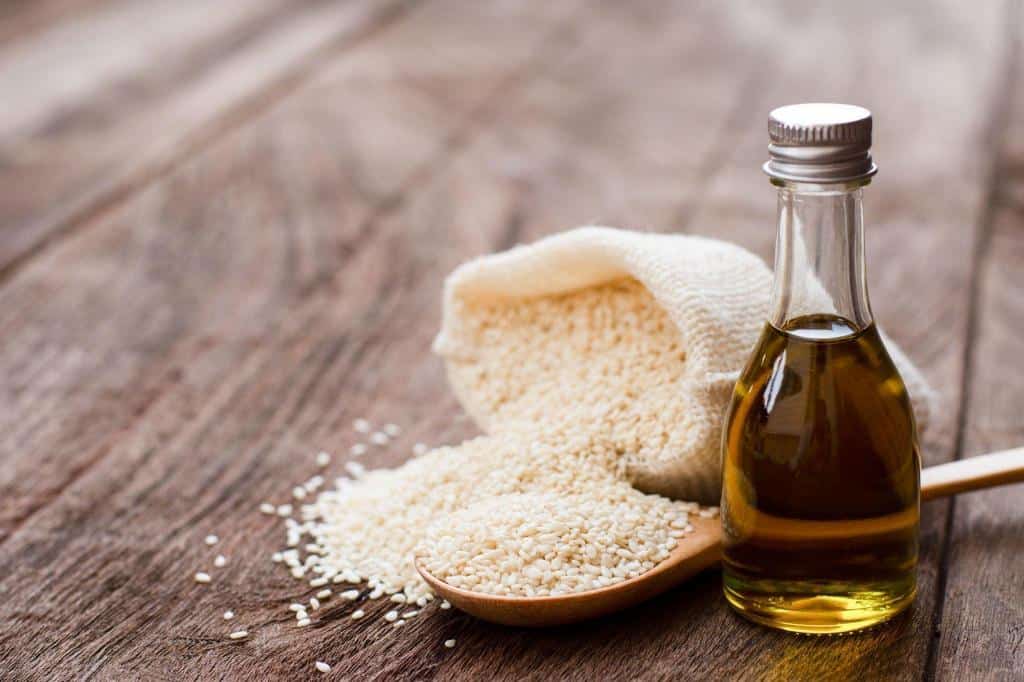What Does Sesame Oil Taste Like? Does It Taste Bitter?

Sesame oil is a popular cooking oil that is made from the seeds of the sesame plant. It has a distinctive flavor and smell that is beloved by many people around the world.
Sesame oil has a unique flavor that pairs well with a variety of ingredients and adds depth to dishes. It is often used in stir-fries, marinades, and dipping sauces and can be combined with other ingredients, such as vinegar and soy sauce, to create flavorful dressings and sauces.
Sesame oil is also a popular choice for grilling and can be brushed on meats and vegetables to add flavor.
Have you ever wondered what sesame oil tastes like? In this post, we’ll explore the flavor of sesame oil and answer the question: does sesame oil taste bitter?
Whether you’re a seasoned sesame oil user or just curious about this tasty condiment, keep reading to learn more about the taste and potential bitterness of sesame oil.
What Does Sesame Oil Taste Like?
Sesame oil is a type of oil that is extracted from sesame seeds and is commonly used in cooking. It has a nutty, slightly sweet taste that makes it stand out and gives dishes more depth.
There are two main types of sesame oil: unrefined and refined.
- Unrefined sesame oil is made from raw sesame seeds and has milder flavor and lighter color. It is often used in Asian cooking and is known for being able to stand up to high temperatures.
- Refined sesame oil is made from roasted sesame seeds and has a strong, nutty flavor that is often described as “toasty. It is often used in salad dressings and as a finishing oil for dishes.
Sesame seeds come in a range of colors, including white, black, and brown, and each type has its own distinct flavor profile.
White sesame seeds tend to taste milder, while black sesame seeds have a stronger, nuttier taste. Similarly, the flavor of sesame oil can be affected by the quality of the sesame seeds used to make it.
Does Sesame Oil Taste Bitter?
Sesame oil is known for its nutty and slightly sweet flavor, but it can sometimes have a bitter taste. This bitterness is usually caused by rancidity or low-quality sesame seeds.
Sesame oil is prone to rancidity because it is made from sesame seeds, which contain high levels of polyunsaturated fat. When these fats are exposed to oxygen, heat, or light, they can become rancid, giving the oil a bitter taste.
Low-quality sesame seeds can also contribute to a bitter taste in sesame oil. Sesame seeds that are stale, moldy, or contaminated with chemicals can affect the flavor of the oil.
In general, properly processed and fresh sesame oil should not have a bitter taste. If you experience a bitter taste when using sesame oil, it may be a sign that the oil is rancid or made from low-quality sesame seeds. To ensure the best flavor, look for sesame oil that is made from freshly ground sesame seeds and processed using a method that preserves the flavor and nutrients of the seeds.
How to Reduce Sesame Oil’s Bitterness
If you’ve experienced a bitter taste when using sesame oil, there are a few ways you can try to lessen the bitterness.
- To start off, try mixing sesame oil with other oils that have milder flavors, such as olive or vegetable oil. This will help dilute some of the bitterness while still adding flavor to your dish.
- You can add small amounts of sugar or salt when using sesame oil as this may help balance out its flavor.
- Add honey to soften the bite of the sesame flavor.
- Adding herbs like basil and cilantro is another option for enhancing the taste without too much bitterness.
- If you are looking for a way to lessen bitterness in your food without adding extra sugar or salt, try using a strainer. This is an easy way to remove some of the excess bits of sesame seeds from the oil and make it less bitter.
- When adding sesame oil, just add a small amount of sesame oil to a stir-fry or salad dressing, or use it to finish a dish by drizzling it over the top just before serving.
With a little experimentation and the right techniques, you can enjoy the rich, nutty flavor of sesame oil in your cooking without the bitterness.
What is the Smell of Sesame Oil?
The smell of sesame oil is also quite distinct. It has a strong, toasty aroma that is often described as nutty or earthy. Some people also detect hints of sweetness or fruitiness in the smell of sesame oil.
The flavor and smell of sesame oil can vary depending on the quality of the seeds used and the method of extraction, so it is important to choose a high-quality brand if you want the best taste and aroma.
How To Choose and Use Sesame Oil
When choosing sesame oil, there are a few things to think about, such as the type of sesame seeds used and how they were processed.
First, it is important to consider the type of sesame seeds used to make the oil. Sesame seeds come in two main varieties: white and black. White sesame seeds are typically used to make light-colored sesame oil, while black sesame seeds are used to make darker-colored oil.
Each type of sesame seed has its own unique flavor and nutritional profile, so it is important to choose the right type of sesame seed for your specific needs.
In addition to the type of sesame seeds used, it is also important to consider the processing method. There are two main types of sesame oil: raw and toasted. Raw sesame oil is made from cold-pressed sesame seeds and has a more mild flavor and lighter color. Toasted sesame oil is made from toasted sesame seeds and has a stronger, nuttier flavor and a darker color.
The processing method can greatly affect the flavor and nutritional value of the sesame oil, so it is important to choose the right one for your needs.
Another factor to consider is the source of the sesame seeds. It is important to choose sesame oil made from sesame seeds that have been grown organically and sustainably to ensure that the oil is of high quality and has not been exposed to pesticides or other harmful chemicals.
When choosing sesame oil, you should think about the type of sesame seeds used, how the oil is made, and where the sesame seeds come from to make sure you get a high-quality, tasty, and healthy oil.






